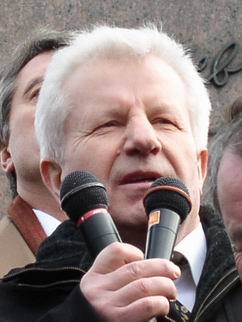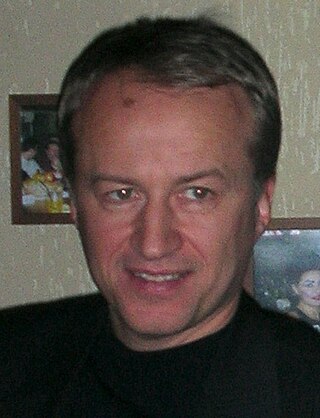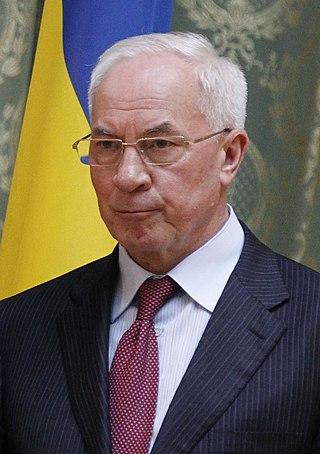
Leonid Danylovych Kuchma is a Ukrainian politician who was the second president of Ukraine from 19 July 1994 to 23 January 2005. The only President of Ukraine to serve two terms, his presidency was marked by democratic backsliding and the growth of the Ukrainian oligarchs, as well as several scandals and improvement of Russia–Ukraine relations.

Georgiy Ruslanovych Gongadze was a Georgian-Ukrainian journalist and film director who was kidnapped and murdered in 2000 near Kyiv. He founded the online newspaper Ukrainska Pravda along with Olena Prytula in 2000.

Volodymyr Mykhailovych Lytvyn is a Ukrainian politician best known for being Chairman of the Verkhovna Rada, the Ukrainian parliament. Having previously served in that position from 2002 until 2006, he was re-elected in December 2008 after his party agreed to join the former coalition of Yulia Tymoshenko in an expanded capacity and stayed Chairman until December 2012. From 1994 to 1999, Lytvyn was the aide to President Leonid Kuchma and, later, the head of his office.

The Orange Revolution was a series of protests that lead to political upheaval in Ukraine from late November 2004 to January 2005. It gained momentum primarily due to the initiative of the general population, sparked by the aftermath of the 2004 Ukrainian presidential election run-off which was claimed to be marred by massive corruption, voter intimidation and electoral fraud. Kyiv, the Ukrainian capital, was the focal point of the movement's campaign of civil resistance, with thousands of protesters demonstrating daily. Nationwide, this was highlighted by a series of acts of civil disobedience, sit-ins, and general strikes organized by the opposition movement.
The Cassette Scandal was a Ukrainian political scandal in November 2000 in which Ukrainian president Leonid Kuchma was caught on tape ordering the months-earlier kidnapping of journalist Georgiy Gongadze, whose decapitated corpse had recently been found. The scandal was one of the main political events in Ukraine's post-independence history, dramatically affecting the country's domestic and foreign policy. The scandal, triggering the Ukraine Without Kuchma protests, also began a slow and gradual shift of Ukraine's political and cultural orientation from Russia towards the West, although this only became more pronounced after Euromaidan in 2013–2014. The scandal also damaged Kuchma's political career.

Ukraine without Kuchma was a mass protest campaign that took place in Ukraine in 2000–2001, demanding the resignation of President Leonid Kuchma, and preceding the Orange Revolution. Unlike the Orange Revolution, Ukraine without Kuchma was effectively extinguished by the government enforcement units, and followed by numerous arrests of the opposition and the Ukrainian-speaking participants. Seeking the criminal responsibility for those events was renewed with the election of Viktor Yanukovych as the President of Ukraine.

Oleksandr Oleksandrovych Moroz is a Ukrainian politician. He was the Chairman of the Verkhovna Rada twice, from 1994 to 1998 and again from 2006 to 2007. Moroz is one of the founders and the leader of the Socialist Party of Ukraine, formerly an influential political party in Ukraine. Moroz lost parliamentary representation when the Socialist Party failed to secure sufficient number of votes (2.86%) in the 2007 snap parliamentary election, falling 0.14% short of the 3% election threshold.

Ukrainska Pravda is a Ukrainian online newspaper founded by Georgiy Gongadze on 16 April 2000. Published mainly in Ukrainian and select articles published in English, the newspaper is tailored for a general readership with an emphasis on the politics of Ukraine.

Yevhen Kyrylovych Marchuk was a Ukrainian politician, intelligence officer, and general who served as the fourth Prime Minister of Ukraine after its independence in 1991.

Yuriy Fedorovych Kravchenko was a Ukrainian General of Internal Service and statesman, serving as the country's Minister of Internal Affairs (1995—2001). In 2000, while he was serving as the Minister of Internal Affairs, Kravchenko became directly involved in the murder case of Georgiy Gongadze and the subsequent "Cassette Scandal." Kravechenko later was the governor of the Kherson Oblast (2001—2002) and Head of the State Tax Administration of Ukraine (2002—2003).

Myroslava Gongadze is a Ukrainian journalist currently living in the United States. Her husband, journalist Georgiy Gongadze, was abducted and murdered in 2000. Since then she has been a prominent advocate for freedom of the press and protection of the safety of reporters in Ukraine, and has continued to work for justice in the case of her husband's murder.

Oleksandr Oleksiyovych Zinchenko was a Ukrainian politician who was Director-General of the National Space Agency of Ukraine from 2009 to 2010. Oleksandr Zinchenko had a controversial career that includes Soviet Komsomol leadership, business in Russia and Ukraine, participation in the pro-Leonid Kuchma Social Democratic Party of Ukraine (united), survival of cancer and joining the anti-Kuchma opposition.

STB is a Ukrainian commercial television network. Today, the coverage area of the network is 85% of Ukraine's territory. It is broadcast in all Oblast centers and all Ukrainian cities with a population greater than 50,000. It occupies the 1st place in the list of the leading TV networks in Ukraine.

Mykola Yanovych Azarov is a Ukrainian politician who was the Prime Minister of Ukraine from 11 March 2010 to 27 January 2014. He was the First Vice Prime Minister and Finance Minister from 2002 to 2005 and again from 2006 to 2007. Azarov also served ex officio as an acting prime minister in the First Yanukovych Government when Viktor Yanukovych ran for president at first and then upon the resignation of his government.

Vasyl Petrovych Klymentyev was a Ukrainian investigative journalist and the editor-in-chief of the newspaper Noviy Stil based in Kharkiv, Ukraine.
Volodymyr Tsvil is a Ukrainian public figure and a former Ukrainian Consul in Munich.

Leonid Vasyliovych Derkach was a Soviet and Ukrainian politician, intelligence officer, and general who was Head of the Security Service of Ukraine from 22 April 1998 to 10 February 2001. Called the "Ukrainian Sorge", he headed one of the five groups in the Dnipropetrovsk Mafia. The Derkach family maintains very close relationships with Oleg Deripaska, Mikhail Fridman's Moscow-based Alfa Group and Petr Aven's Alfa-Bank.

The Militsiya was a type of domestic law enforcement agency (militsiya) that existed in various forms in Ukraine from 1919 until 2015. The Militsiya was originally formed while Ukraine was governed by the Ukrainian Soviet Socialist Republic, part of the Soviet Union, and it continued to serve as a national police service in post-Soviet Ukraine until it was replaced by the National Police of Ukraine on 7 November 2015. The Militsiya was under the direct control of the Ministry of Internal Affairs, and it was widely seen as corrupt and inconsiderable to the demands of the Ukrainian public. During Euromaidan, the Militsiya was accused of brutality against protestors as well as kidnapping Automaidan activists, leading to the reputation of the Militsiya being irreversibly damaged. This resulted in its replacement under the post-Maidan Poroshenko presidency.

Andrii Leonidovych Derkach, also known as Andrei Leonidovich Derkach is a Russian and former Ukrainian politician and businessman who had been a member of the Verkhovna Rada from 1998 to January 2020, serving seven terms, with several parties, and was stripped of Ukrainian citizenship.

Serhiy Ivanovych Rakhmanin is a Ukrainian journalist and politician currently serving as a People's Deputy of Ukraine on the proportional list of the Holos party since 2019. Prior to his election, he was the deputy chief editor at Dzerkalo Tyzhnia and a reporter for other Ukrainian news programmes.

















